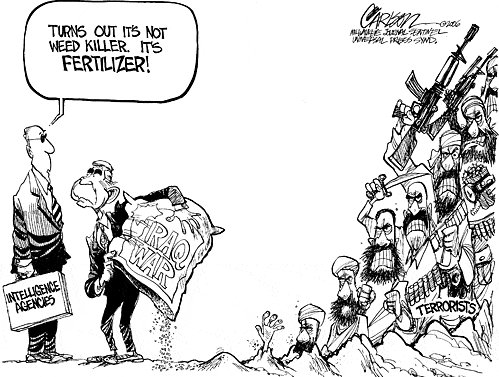Search
Recent comments
- mossad.....
9 hours 58 min ago - palantir...
11 hours 9 min ago - reckoning....
11 hours 34 min ago - RBA BS...
12 hours 5 min ago - clintons to testify....
12 hours 10 min ago - all in it.....
16 hours 30 min ago - friends for peace.....
19 hours 7 min ago - growing.....
19 hours 17 min ago - the epstein sewer....
1 day 6 hours ago - not ready?....
1 day 6 hours ago
Democracy Links
Member's Off-site Blogs
tweedledumb & tweedledumber .....

‘The war in Iraq passed a significant but little remarked anniversary this summer. The conflict that President George Bush announced was in effect over on 1 May 2003 has now gone on longer than the First World War. Like that great conflict almost a century ago, the Iraqi war has been marked by repeated claims that progress is being made and that a final breakthrough is in the offing.
Six months after the surge was actually launched, in mid- February, it has failed as dismally as so many First World War offensives. The US Defense Department says that, this June, the average number of attacks on US and Iraqi forces, civilian forces and infrastructure peaked at 177.8 per day, higher than in any month since the end of May 2003.
The US has failed to gain control of Baghdad. The harvest of bodies picked up every morning first fell and then rose again. This may be because the Mehdi Army militia, who provided most of the Shia death squads, was stood down by Sadr. Nobody in Baghdad has much doubt that they could be back in business any time they want.
Whatever Bush might say, the US military commanders in Iraq clearly did not want to take on the Mehdi Army and the Shia community when they were barely holding their own against the Sunni.
The surge is now joining a host of discredited formulae for success and fake turning-points that the US (with the UK tripping along behind) has promoted in Iraq over the past 52 months. In December 2003, there was the capture of Saddam Hussein. Six months later, in June 2004, there was the return of sovereignty to Iraq. "Let freedom reign," said Bush in a highly publicised response. And yet the present Iraqi Prime Minister, Nouri al-Maliki, claims he cannot move a company of soldiers without American permission.’
The Surge: A Special Report By Patrick Cockburn
meanwhile …..
‘The Bush administration is becoming increasingly concerned about the impact of an imminent British withdrawal from southern Iraq and would prefer UK troops to remain for another year or two.
British officials believe that Washington will signal its intention to reduce US troop numbers after a much-anticipated report next month by its top commander in Iraq, General David Petraeus, clearing the way for Gordon Brown to announce a British withdrawal in parliament the following month. An official said: "We do believe we are nearly there."
It is not known whether George Bush expressed concern about the withdrawal of the remaining 5,000 British troops when he met Mr Brown in Washington last week. But sources, who spoke on condition of anonymity, said the administration was worried about the political consequences of losing British troops.’
US Uneasy As Britain Plans For Early Iraq Withdrawal
No doubt it was bushit’s increasing sense of isolation that prompted him to call rattus last week to renew their mutual resolve over the wars in Afghanistan & Iraq.
As his nose grows increasingly longer, rattus claimed on the radio today that "there's progress being made" in the middle east.
"It's not all negative. Nobody pretends that it's easy,'' rattus asserted, before obscenely insisting that a US withdrawal would cause Iraq to descend "into civil war & chaos".
Chaos?
- By John Richardson at 9 Aug 2007 - 8:17pm
- John Richardson's blog
- Login or register to post comments
Solace anywhere Karzai can...
Robert Tait in Tehran
Wednesday August 15, 2007
The Guardian
Iran's president, Mahmoud Ahmadinejad, signalled his determination to counter US global power yesterday by meeting his Afghan counterpart, Hamid Karzai, in a demonstration of growing Iranian influence in Afghanistan.
The visit - Mr Ahmadinejad's first to Afghanistan, where the US, Britain and other western powers are engaged in a bitter struggle with the Taliban - is certain to alarm the Bush administration, which accuses Tehran of destabilising its efforts and claims the Taliban is being armed with Iranian weapons. Iran, which is mainly, Shia, denies helping the Taliban, whose puritanical Sunni ideology it has condemned.